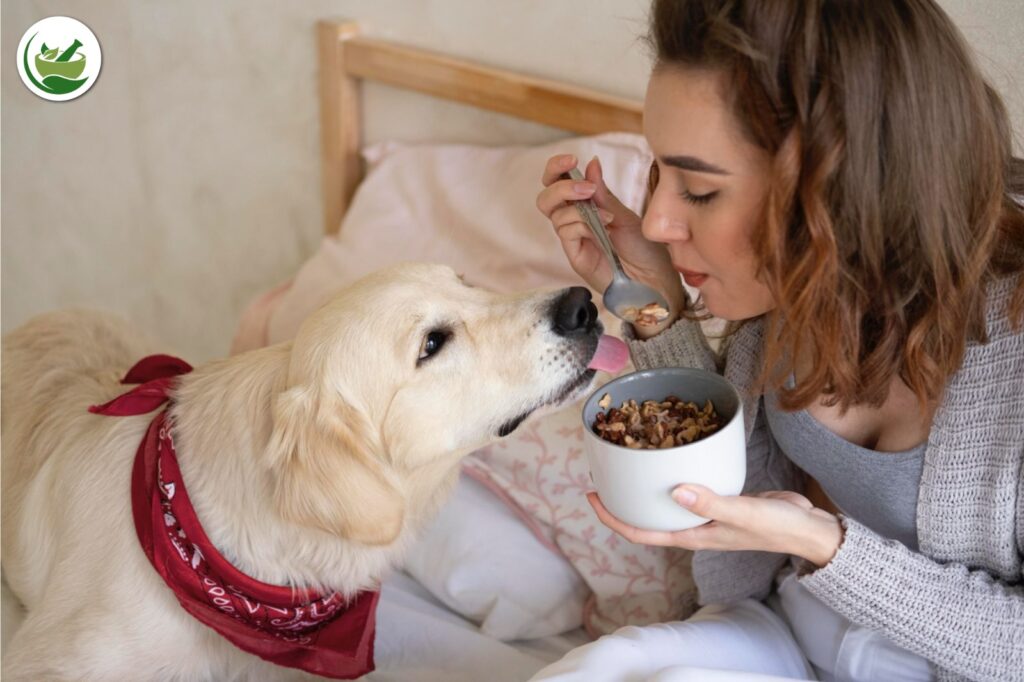
Chia seeds, the tiny powerhouses packed with nutrients, aren’t just for human consumption. These little wonders can also provide numerous health benefits for our four-legged companions. In this article, we’ll explore the incredible benefits of incorporating chia seeds into your dog’s diet, backed by science and expert insights.
Read More Blogs on Chia Seeds
What are chia seeds?
Chia seeds, derived from the Salvia hispanica plant, are tiny edible seeds native to Mexico, Central America, and South America. These versatile seeds, available in various colors, absorb ten times their weight in liquid, making them popular in cooking and baking. Historically consumed for energy by Mesoamerican cultures, modern diners appreciate chia seeds as a gluten-free superfood. Packed with antioxidants to prevent cell damage and rich in soluble fiber for appetite control, they may also help regulate blood sugar levels.
Is it safe for dogs to consume chia seeds?
In moderation, dogs can safely partake in chia seeds and may even find nutritional benefits in doing so. It is important, however, to adhere to proper serving sizes based on your dog’s weight, limiting it to up to a quarter teaspoon per ten pounds.
Introducing chia seeds to your dog’s diet should be approached with caution, like introducing any new human food. Start with smaller amounts and gradually increase to the recommended serving size for your dog’s weight. Keep a close eye on your pet for any potential adverse reactions after consumption. As a precautionary measure, always consult with your veterinarian before adding any human foods to your pet’s diet.
Benefits of Chia Seeds for Dogs
Rich in Omega-3 Fatty Acids
- Promotes healthy skin and beautiful coat.
- Helps reduce inflammation and joint discomfort.
High in Fiber
- Improves digestive health and prevents constipation.
- Promotes feelings of fullness, which aids with weight management.
Excellent Source of Antioxidants
- Assists in the neutralization of free radicals, which benefits general health.
- Contributes to a strong immune system.
Regulates Blood Sugar
- Beneficial for diabetic dogs by stabilizing blood sugar levels.
Provides Essential Nutrients
- Supplies essential vitamins and minerals for overall well-being.
- Supports optimal organ function.
Ingredients for Chia Seeds
- Omega-3 fatty acids
- Fiber
- Antioxidants
- Protein
- Vitamins (B, C, and E)
- Minerals (calcium, phosphorus, and magnesium)
Chia Seed Recipes for Dogs
Pudding with Chia Seed:
- Mix 2 tablespoons of chia seeds with 1/2 cup of water or dog-friendly broth.
- Allow it to sit for a few hours or overnight until it forms a gel-like consistency.
- Serve it as a tasty and nutritious treat.
Chia Seeds Smoothie Topper:
- Blend your dog’s favorite fruits with water or yogurt.
- Sprinkle a teaspoon of chia seeds on top for an extra nutrient boost.
Dog Biscuits:
- Mix 1 cup of whole wheat flour, 1/4 cup of chia seeds, and 1/4 cup of water.
- Form into small biscuits and bake until golden brown.
Chia Seed Frozen Treats:
- Mix chia seeds with unsweetened coconut milk or yogurt.
- Freeze in small molds for a refreshing and healthy summer treat.
Potential Risks of Chia Seeds for Canines
Before incorporating chia seeds into your dog’s diet, familiarize yourself with their potential adverse effects.
Allergic Reactions:
- Chia seeds may trigger allergies in some dogs.
- Watch for symptoms like excessive scratching, diarrhea, vomiting, rashes, and eyelid inflammation.
Digestive Problems:
- The high fiber content in chia seeds can lead to gassiness, bloating, and other digestive issues.
- Regular feeding may exacerbate these problems in some dogs.
Intestinal Blockages:
- Dry chia seeds absorb over ten times their weight in water.
- Serving them without soaking poses a risk of excess water absorption in the intestines.
- This could lead to partial or complete blockages.
- Always soak chia seeds until visibly expanded before feeding to prevent this dangerous condition.
How to Safely Include Chia Seeds in Your Dog’s Diet
Ensure the well-being of your furry friend by following these guidelines for introducing chia seeds to their diet:
Seek professional advice:
Prior to incorporating human foods, such as chia seeds, into your dog’s diet, consult your veterinarian for guidance.
Choose organic options:
Opt for organic chia seeds without harmful additives like chemicals, pesticides, or artificial sweeteners when feeding your dog.
Pre-soak before serving:
Before adding chia seeds to your dog’s food, soak them in water for at least thirty minutes to prevent potential health complications like choking or intestinal blockage. For optimal results, consider an overnight soak and make sure to use the soaked seeds within three days.
Determine the appropriate serving size:
Tailor the amount of chia seeds based on your dog’s body weight, with smaller dogs requiring less than larger ones. Generally, feed your dog a quarter teaspoon of chia seeds per ten pounds of body weight. For precise guidance, consult your vet regarding the proper quantity and frequency.
Sprinkle on food:
Enhance your dog’s regular food by sprinkling chia seeds as a nutritious garnish. Check the pet food label beforehand to ensure it does not already contain chia seeds to avoid overfeeding.
Monitor your dog’s response:
Introduce new foods gradually and observe your dog’s behavior for any adverse reactions. If you notice signs of allergies, such as nausea, digestive issues, dehydration, or fatigue, discontinue feeding chia seeds and consult your veterinarian promptly.
What is the appropriate quantity of chia seeds to feed my dog?
Even finicky eaters are likely to enjoy chia seeds due to their subtle flavor and aroma. Administer a modest amount by providing 1/4 teaspoon per day for every 10 pounds of your dog’s body weight. These seeds can be sprinkled on their regular food or soaked in water to create a pudding, serving as a delightful snack or food enhancement.
Read more Effects of Chia Seeds on Growth Performance
Conclusion
In conclusion, while chia seeds offer numerous health benefits for dogs, it is crucial to introduce them cautiously, adhering to proper serving sizes. The rich nutritional profile can enhance your dog’s well-being, but potential risks such as allergies and digestive issues must be monitored. Always consult with a veterinarian before incorporating new foods, ensuring a balanced and safe diet for your furry companion.






